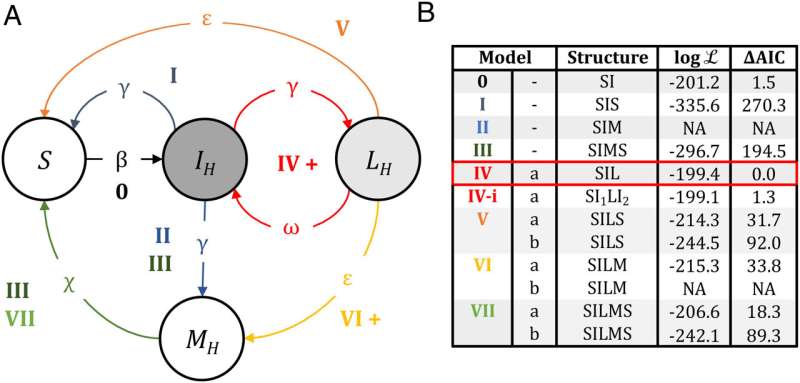March 15, 2023 report
This article has been reviewed according to Science X's editorial process and policies. Editors have highlighted the following attributes while ensuring the content's credibility:
fact-checked
peer-reviewed publication
trusted source
proofread
Testing the idea of using a fast-spreading virus to inoculate colonies of bats against rabies

A team of virologists and veterinary scientists from the Medical Research Council–University of Glasgow Center for Virus Research and the University of Glasgow's School of Biodiversity, One Health and Veterinary Medicine, is exploring the idea of genetically modifying a harmless but fast-spreading virus to infect and inoculate bats in a colony against rabies. In their paper published in Proceedings of the National Academy of Sciences, the group describes their simulation of how such a vaccine might work and demonstrated its possibilities.
For many years, cattle and other livestock ranchers in South America have been battling rabies infections in their animals—most of which become infected due to vampire bat bites. The traditional tool has been bat culling, using vampiricides to kill as many of the bats as possible. But recent research has suggested that such culling is only effective if done before the bats start infecting livestock.
Some thought has been given to vaccinating either the livestock, the bats or both. But vaccinating livestock is expensive, and vaccinating whole colonies of bats seems untenable. In this new effort, the team in Scotland has begun testing the possibility of a new approach—using a virus to vaccinate a colony of bats.
The idea is to find a virus that already readily infects bats, but does not harm them. Then, to modify that virus in a way that makes an infected bat immune to rabies infections. Under such a scheme, only one bat would need to be manually vaccinated—the rest would be vaccinated through infections.
To test the initial stages of such an idea, the research team built epidemiological models to test the feasibility of the spread of such viral infections based on Desmodus rotundus betaherpesvirus (DrBHV)—a virus that is known to cause benign, lifelong infections in vampire bats. The team used field data to test the model. The simulations showed the approach could potentially inoculate up to 80% of a bat colony and dramatically reduce the threat posed by outbreaks. They further suggest that a potential vaccine used in such a manner could work by boosting the immune systems of the bats, allowing them to fight off rabies infections.
More information: Megan E. Griffiths et al, Inferring the disruption of rabies circulation in vampire bat populations using a betaherpesvirus-vectored transmissible vaccine, Proceedings of the National Academy of Sciences (2023). DOI: 10.1073/pnas.2216667120
Journal information: Proceedings of the National Academy of Sciences
© 2023 Science X Network





















